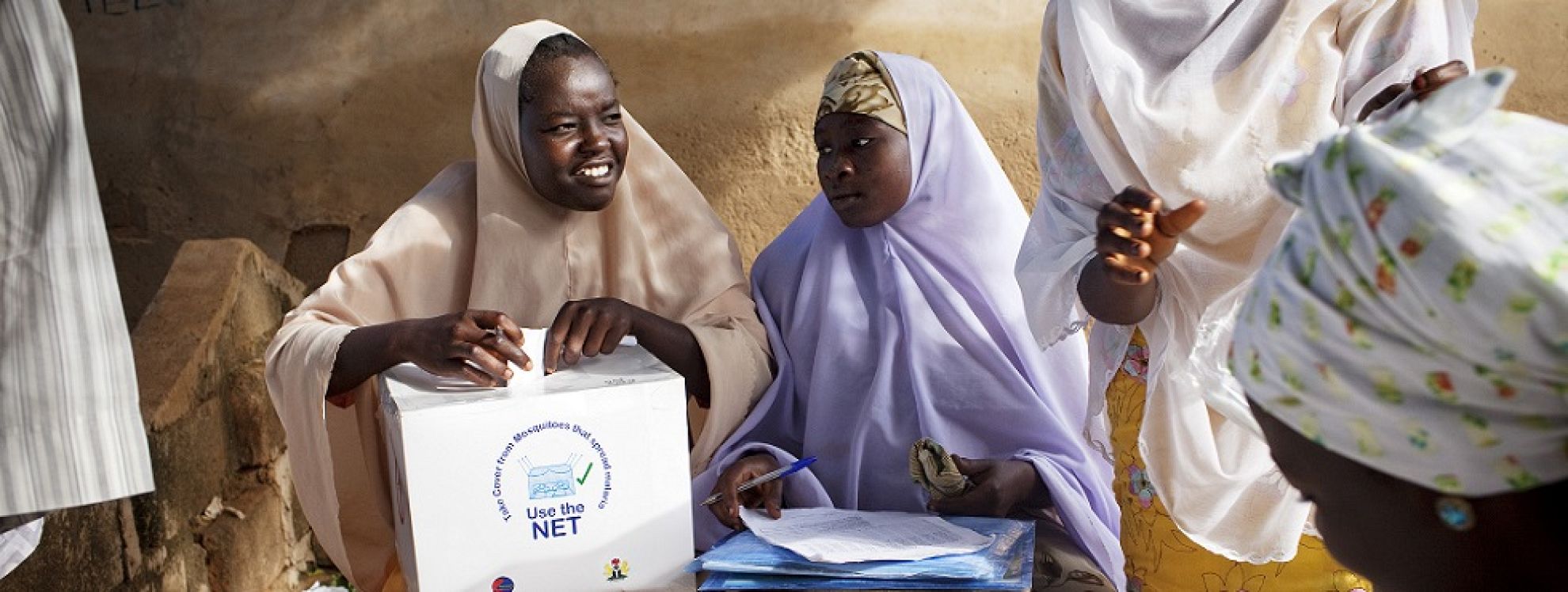
Malaria Consortium's support to planning and capacity building in Nigeria acknowledged at Annual Performance Review
3 September 2015During August, an evaluation team from the UK Department for International Development (DfID) met with stakeholders and partners in Nigeria as part of its annual programme review of ‘Support to National Malaria Programme in Nigeria’ (SuNMaP), the seven-year project led by Malaria Consortium and funded by the UK government. As the project nears its end this year, the meeting has provided a platform to discuss accomplishments, lessons learnt and future plans for sustaining the work of the programme.
The project began in 2008 against a bleak backdrop – in a country of over 160 million, the average life expectancy was 44 years. Maternal mortality was at a rate of 545 deaths per 100,000, while under-five mortality was at 157 deaths for every 1,000 children. Every year, 219,000 children under five died from malaria – a staggering 25 percent of the global total.
SuNMaP has taken a multi-pronged approach to reducing malaria in the country, focusing on six different elements of health system strengthening: capacity building, harmonisation, prevention, treatment, demand creation and operational research. Working at the federal level and in 10 states, the SuNMaP project has reached up to 40 percent of Nigeria’s population with interventions meant to reduce the burden of malaria in the country.
The result has been a strengthened landscape for malaria interventions. For malaria prevention, long lasting insecticide-treated net (LLIN) ownership has increased from seven percent in 2008 to over 58 percent in 2014, with new LLIN distribution guidelines being adopted by government agencies and partners. Regarding malaria treatment to date, a cumulative total of over five million artemisinin combination therapies (ACTs) have been sold through retail channels with support from the UK government, as well as over 100,000 rapid diagnostic tests for malaria (mRDTs). Moreover, with the series of capacity building activities supported by SuNMaP, health workers and private medicine vendors are better equipped than ever to handle cases of malaria. This has resulted in an estimated two million Disability Adjusted Life Years (DALYs) being averted – a common measurement of healthy years lost as a result of disability and disease.
At the performance review, the National Malaria Elimination Programme (NMEP) commended SuNMaP for being a responsive programme, which has been receptive to the needs of the government and the people of Nigeria. State governments also appealed for the continuation of SuNMaP, citing the positive results observed so far.
Dr Eniola Erinosho, the Lagos State Director for Disease Control, acknowledged that Lagos benefited greatly from SunMaP’s work building capacity of healthcare providers to manage malaria more effectively, improving supply stocks and helping in the distribution of antimalarial commodities through improved logistics management. He also mentioned that one of the greatest assets for his state has been the development of an annual work plan supported by the SuNMaP.
Alhaji Abba Ladan Kailani, the Permanent Secretary of the Ministry of Health in Kano State, also praised the programme’s work in northern Nigeria: “SuNMaP is Kano State’s most important partner in malaria programming,” he said. “All of the successes recorded by Kano in the fight against malaria are driven by annual operation plan documents which were institutionalised with the help of the SuNMaP programme.”
The malaria programme environment in Nigeria has improved dramatically since the start of the programme. SuNMaP was set up to support and harmonise sustainable initiatives of government and partners, so these achievements will continue to live on and guide malaria elimination efforts in the future. Stakeholders at the series of meetings also discussed options to further build on the accomplishments of SuNMaP through future interventions. With the help of improved capacity, guidelines and tools put in place as a result of the programme, as well as the prospect of continued improvements to health systems, the fight against malaria in Nigeria looks to be making headway.
Learn more about the project by visiting the SuNMaP website, or by clicking on the resources below:
Films
- Building the evidence
- Harmonisation - key to malaria control efforts
- Building health systems capacity
- Supporting the commercial sector
- Improving service delivery for malaria diagnosis and treatment
- SuNMaP - Nets for all. Nigeria leads the fight against malaria
Learning Papers
- Developing a long lasting insecticidal net retail market in Nigeria
- Harmonisation of malaria control in Nigeria
- Building capacity for creating demand in support of malaria prevention and control
- Building capacity for universal coverage: Malaria control in Nigeria
Case studies
- Nigeria: Effective diagnostics at the health centre helps keep malaria under control
- Managing the risk of malaria in pregnancy in Nigeria
- Nigeria Health Heroes
Project briefs
Journal article
Project report
Country: Nigeria
Keywords: Vector control | Health system strengthening | Private sector | Diagnosis | Maternal, neonatal and child health
Related content
10 December 2014
Developing a long lasting insecticidal net retail market in Nigeria
9 February 2012SuNMaP - Nigeria
24 September 2014Supporting the commercial sector
24 September 2014Harmonisation - key to malaria control efforts
Latest news
- International summit calls for AMR accountability in public health interventions21st March 2024
- Global SMC community celebrates new milestone at SMC Alliance Annual Meeting in Nigeria6th March 2024
- Scaling up key interventions could halve pneumonia-related childhood mortality13th February 2024
- Malaria Consortium and eGov Foundation join Mozambique’s national malaria programme to digitalise seasonal malaria chemoprevention campaigns8th February 2024
- World’s first malaria vaccine rollout launched in Cameroon22nd January 2024
- Digital solutions driving equitable access to health6th December 2023